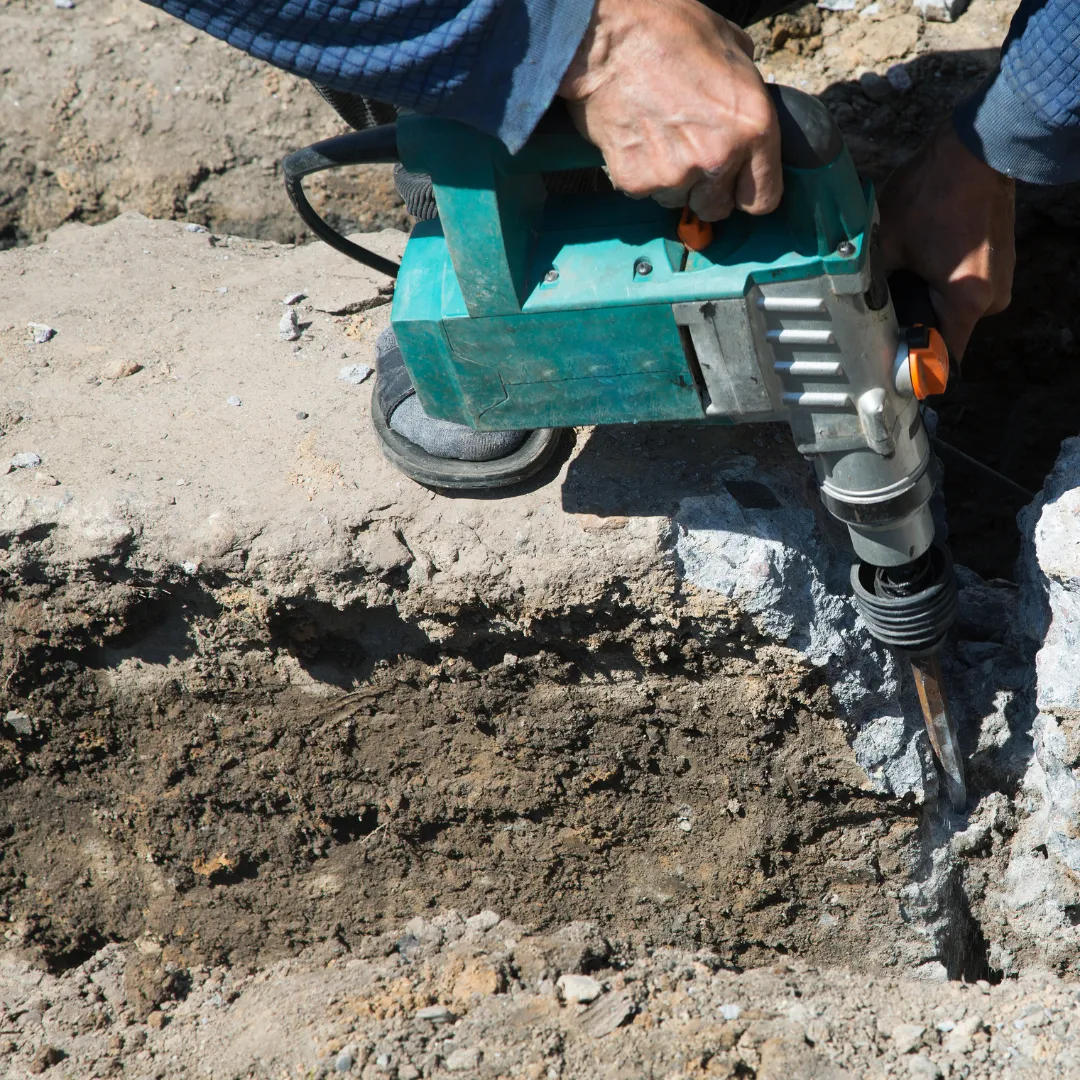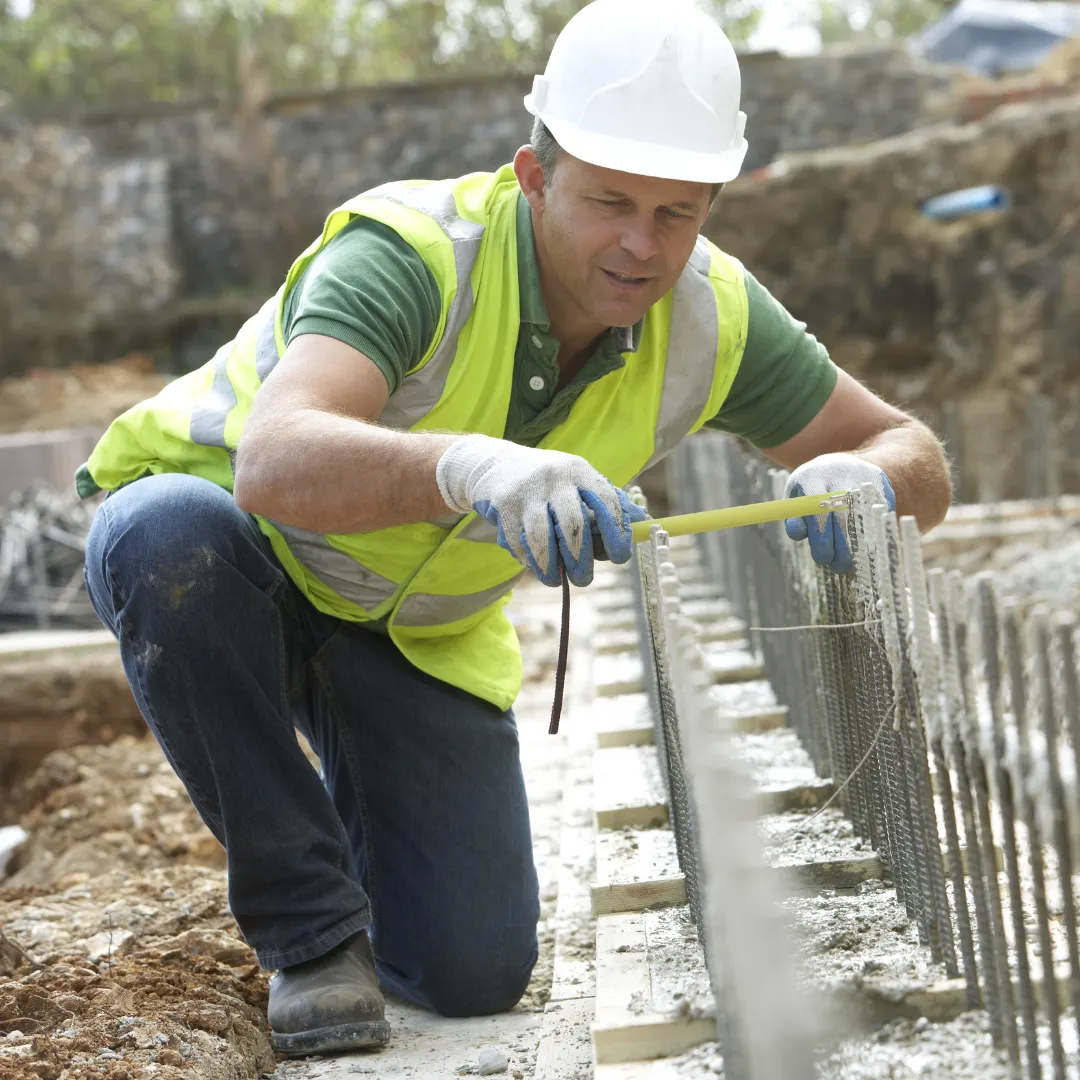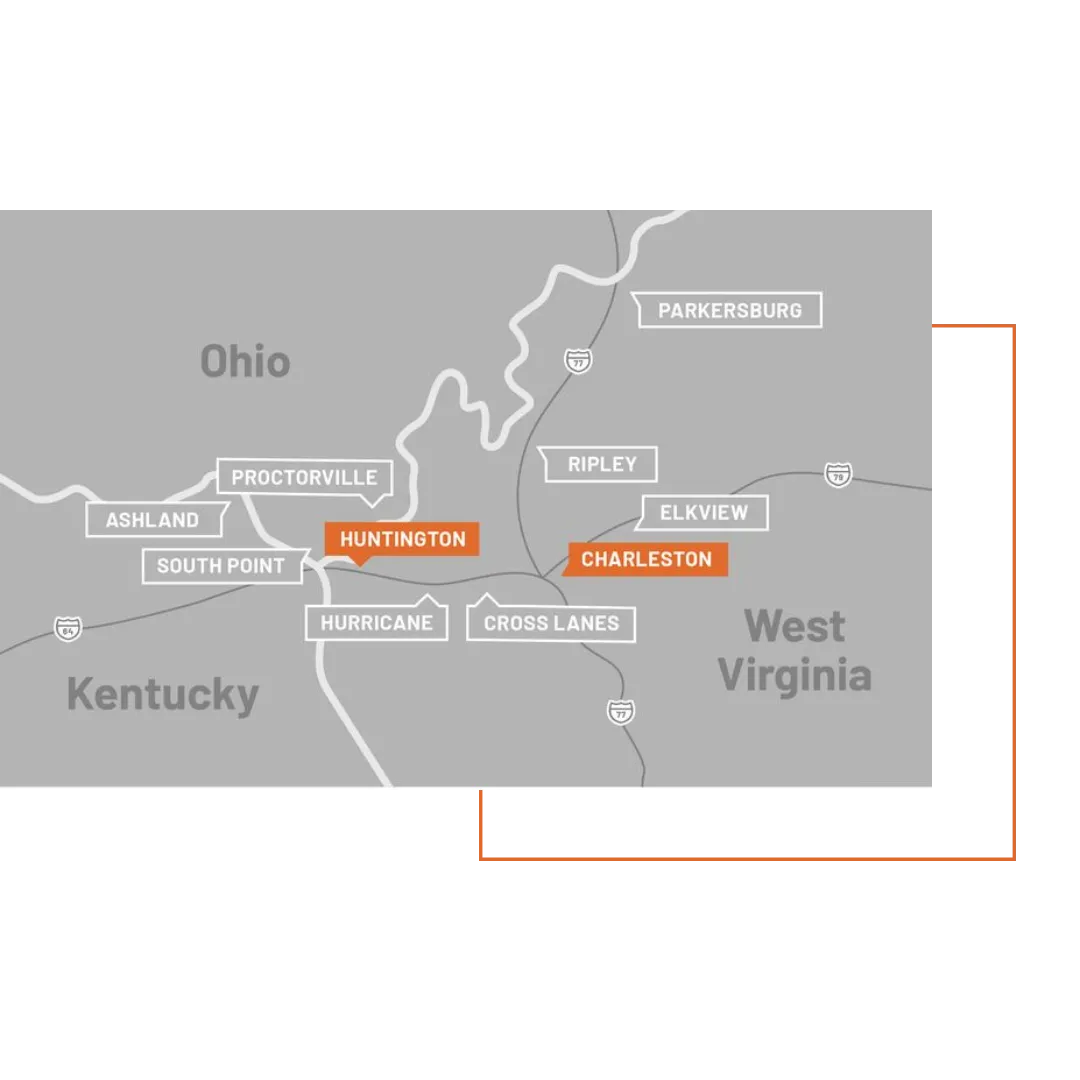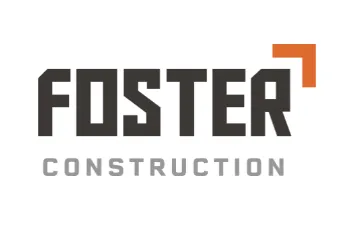
Engineering Services
As your engineer and contractor, we apply our structural engineering
expertise to streamline the entire process—while also reducing total costs.

Engineering Services
As your engineer and contractor, we apply our structural engineering expertise to streamline the entire process—while also reducing total costs.
Oftentimes, foundation repairs fail because the right repair method wasn’t used when the problem was initially evaluated. Foundation issues are complex and can be caused by several different factors. This makes having a registered Professional Engineer a crucial part of the process.
From site inspection to project planning and repairs, we aim to make the foundation repair process as efficient and effective as possible for our customers. Our customized, superior quality solutions are engineer-driven and built to last, so you can have peace of mind in your decision to restore and protect the integrity of your home.
Our services include:
• Foundation Repair Design
• Beam Design
Oftentimes, foundation repairs fail because the right repair method wasn’t used when the problem was initially evaluated. Foundation issues are complex and can be caused by several different factors. This makes having a registered Professional Engineer a crucial part of the process.
From site inspection to project planning and repairs, we aim to make the foundation repair process as efficient and effective as possible for our customers. Our customized, superior quality solutions are engineer-driven and built to last, so you can have peace of mind in your decision to restore and protect the integrity of your home.
Our services include:
• Foundation Repair Design
• Beam Design
Understanding Engineering Services
Engineering services are the unsung heroes behind the advancements and innovations we witness daily. From the infrastructure that supports our cities to the technology we hold in our hands, these services encompass the application of scientific and mathematical principles to develop, design, and maintain structures, machines, systems, and processes. As the bridge between conceptual ideas and tangible realities, engineering services are instrumental in transforming visions into functional solutions that enhance our everyday lives. Dive into the intricacies of these services and appreciate the intricate dance of science, art, and innovation.


Understanding Engineering Services
Engineering services are the unsung heroes behind the advancements and innovations we witness daily. From the infrastructure that supports our cities to the technology we hold in our hands, these services encompass the application of scientific and mathematical principles to develop, design, and maintain structures, machines, systems, and processes. As the bridge between conceptual ideas and tangible realities, engineering services are instrumental in transforming visions into functional solutions that enhance our everyday lives. Dive into the intricacies of these services and appreciate the intricate dance of science, art, and innovation.
Introduction to Engineering Services
Engineering services are an indispensable component of today's industrial and technological landscape, bridging the gap between raw ideas and the reality we see around us. They employ scientific principles to design, develop, and maintain various products, structures, and systems. From the skyscrapers that grace our city skylines to the automobiles that navigate our highways, these services bring visions to life.
Types of Engineering Services
Engineering transcends a wide range of industries, including aerospace, automotive, and civil to name just a few. Whether it's aerospace engineering ensuring aircrafts fly safely, automotive engineers crafting more efficient vehicles, or civil engineers laying down the infrastructure for cities, these services can be found wherever innovation is afoot. With the rise of virtual reality, even technology firms now lean heavily on engineers to turn virtual ideas into palpable experiences.
Benefits of Engineering Services
The true value of engineering services lies in their ability to address and solve complex problems. They improve and innovate existing products, structures, and systems, leading to enhanced performance, safety, and sustainability. For businesses, they pave the way for increased efficiency, reducing overall operational costs. Their expertise also ensures compliance with industry standards, offering peace of mind to clients and stakeholders.
Challenges of Engineering Services
The world of engineering is not without its challenges. From adhering to ever-evolving regulations to the need for continuous training and education in the face of rapidly advancing technologies, engineers are constantly on their toes. Moreover, they're often tasked with striking the perfect balance between innovation, cost-effectiveness, and sustainability.
Quality Assurance in Engineering Services
For any engineering firm, the assurance of quality is paramount. This involves rigorous testing, analysis, prototyping, and implementation processes. Firms uphold high standards, ensuring that projects not only meet but often exceed client expectations. This commitment to quality is a hallmark of top engineering companies globally.
Cost of Engineering Services
The cost of engineering services varies based on the project's complexity, the field of expertise, and the specific requirements of the client. Yet, investments in these services often yield significant returns. As per statistics, the global engineering services market was valued at a staggering $1.47 trillion USD in 2018, highlighting the immense value businesses place on engineering expertise.
Regulations for Engineering Services
Regulations ensure that engineering projects meet industry standards and are safe for both end-users and the environment. Across the United States and other parts of the world, various governmental and non-governmental organizations oversee these standards, ensuring projects comply with local, state, and international requirements.
Professional Organizations for Engineering Services
Many professional organizations, such as the American Society of Civil Engineers (ASCE) and the National Society of Professional Engineers (NSPE), offer support, training, and resources for engineers. These organizations foster a sense of community, providing platforms for collaboration, networking, and continuous education.
Career Opportunities in Engineering Services
The field of engineering offers a wealth of career opportunities. From on-site civil engineers to design-focused mechanical engineers, the possibilities are vast. Furthermore, as technology evolves, new avenues like virtual and augmented reality engineering are emerging, offering exciting roles for the next generation of engineers.
Case Studies of Engineering Services
Numerous case studies spotlight the achievements of engineering firms. For instance, consider a firm that addressed architectural challenges using innovative design solutions, merging aesthetics with functionality. Another might showcase a team of engineers who employed state-of-the-art technology to renovate an age-old building, preserving its historical essence while reinforcing its structure.
In the world of construction, development, and innovation, engineering services stand tall as pillars of progress. Their significance cannot be understated, as they shape the world around us, turning the visions of today into the tangible realities of tomorrow. For businesses, entrepreneurs, or anyone keen on bringing their ideas to life, partnering with an adept engineering firm can be a transformative decision. Let’s go ahead and dig down a bit deeper on each subject.
Introduction to Engineering Services
In today's rapidly evolving world, the role of engineering services cannot be understated. They form the backbone of modern society, ensuring that ideas transition seamlessly from paper sketches to real-world applications. Engineering services are the quintessential combination of scientific principles, creativity, and practicality, serving as a conduit for innovation in diverse industries. Whether it's the awe-inspiring skyscrapers that grace city skylines or a simple home, it's the expertise of engineering services that brings them to life.
Historically, engineering was seen as a discipline focused purely on construction and mechanical innovations. However, with the advancement of technology and the growing needs of the global populace, the field has expanded exponentially. The global engineering services market, valued at a staggering $1.47 trillion USD in 2018, is a testament to its pervasive influence across sectors. From aerospace to biomedical, from civil to software, engineering services are an integral part of every industry, adapting and evolving to meet the challenges of the modern era.
In the United States alone, with its melting pot of industries and technological forefronts, the demand for specialized engineering services is ever on the rise. This shift towards specialization stems from a necessity to cater to the unique demands of each sector. As we delve deeper into the multifaceted world of engineering services, one can appreciate the sheer breadth of its impact, the innovation it fosters, and the solutions it brings to complex challenges. This journey provides an insight into the methodologies, intricacies, and nuances that make engineering services not just a profession, but an art form, especially in the field of foundation repair.


Introduction to Engineering Services
In today's rapidly evolving world, the role of engineering services cannot be understated. They form the backbone of modern society, ensuring that ideas transition seamlessly from paper sketches to real-world applications. Engineering services are the quintessential combination of scientific principles, creativity, and practicality, serving as a conduit for innovation in diverse industries. Whether it's the awe-inspiring skyscrapers that grace city skylines or a simple home, it's the expertise of engineering services that brings them to life.
Historically, engineering was seen as a discipline focused purely on construction and mechanical innovations. However, with the advancement of technology and the growing needs of the global populace, the field has expanded exponentially. The global engineering services market, valued at a staggering $1.47 trillion USD in 2018, is a testament to its pervasive influence across sectors. From aerospace to biomedical, from civil to software, engineering services are an integral part of every industry, adapting and evolving to meet the
challenges of the modern era.
In the United States alone, with its melting pot of industries and technological forefronts, the demand for specialized engineering services is ever on the rise. This shift towards specialization stems from a necessity to cater to the unique demands of each sector. As we delve deeper into the multifaceted world of engineering services, one can appreciate the sheer breadth of its impact, the innovation it fosters, and the solutions it brings to complex challenges. This journey provides an insight into the methodologies, intricacies, and nuances that make engineering services not just a profession, but an art form, especially in the field of foundation repair.

Types of Engineering Services: Spotlight on Civil Engineering and Foundation Repair
Engineering, in its essence, is a vast field, encompassing a multitude of disciplines each addressing unique challenges in their domains. One such pivotal discipline is civil engineering – the backbone of our built environment. Often, when we speak of engineering marvels, our minds drift to towering skyscrapers or expansive bridges, but beneath these structures lies an intricate and equally crucial component: the foundation.Civil engineering focuses on the design, construction, and maintenance of our physical surroundings, ensuring they are both functional and sustainable. Within this vast realm, there's a niche yet highly specialized segment dedicated to foundation repair. The foundation, often unseen, plays a paramount role in maintaining the structural integrity of buildings, bridges, and other constructions. Its strength and stability determine the lifespan and safety of the entire structure it
supports.
Foundation repair services are integral in areas prone to soil shifting, and earthquakes, or where substandard construction methods have been employed. Their role involves a comprehensive understanding of geotechnics, structural dynamics, and construction materials. By using cutting-edge technology and methods such as soil stabilization, underpinning, and pairing, engineers rectify problems that might lead to disastrous structural failures. Various engineering firms in the United States, backed by a combined wealth of experience and state-of-the-art technology, offer tailored solutions to foundation-related challenges. Their services are not limited to mere reactive measures; they encompass proactive strategies like soil analysis, groundwater management, and load distribution assessments to ensure a structure's longevity.
In 2019, regions like the Asia Pacific and North America, which collectively held over 66% of the global engineering services market, witnessed an uptick in urbanization. This surge increased the demand for specialized services related to foundation repair, particularly in areas with challenging terrains or seismic activities. As urban landscapes continue to expand and the emphasis on sustainable construction practices grows, civil engineering, especially services related to foundation integrity, will remain at the forefront, ensuring our structures stand tall and safe.

Types of Engineering Services: Spotlight on Civil Engineering and Foundation Repair
Engineering, in its essence, is a vast field, encompassing a multitude of disciplines each addressing unique challenges in their domains. One such pivotal discipline is civil engineering – the backbone of our built environment. Often, when we speak of engineering marvels, our minds drift to towering skyscrapers or expansive bridges, but beneath these structures lies an intricate and equally crucial component: the foundation.Civil engineering focuses on the design, construction, and maintenance of our physical surroundings, ensuring they are both functional and sustainable. Within this vast realm, there's a niche yet highly specialized segment dedicated to foundation repair. The foundation, often unseen, plays a paramount role in maintaining the structural integrity of buildings, bridges, and other constructions. Its strength and stability determine the lifespan and safety of the entire structure it
supports.
Foundation repair services are integral in areas prone to soil shifting, and earthquakes, or where substandard construction methods have been employed. Their role involves a comprehensive understanding of geotechnics, structural dynamics, and construction materials. By using cutting-edge technology and methods such as soil stabilization, underpinning, and pairing, engineers rectify problems that might lead to disastrous structural failures. Various engineering firms in the United States, backed by a combined wealth of experience and state-of-the-art technology, offer tailored solutions to foundation-related challenges. Their services are not limited to mere reactive measures; they encompass proactive strategies like soil analysis, groundwater management, and load distribution assessments to ensure a structure's longevity.
In 2019, regions like the Asia Pacific and North America, which collectively held over 66% of the global engineering services market, witnessed an uptick in urbanization. This surge increased the demand for specialized services related to foundation repair, particularly in areas with challenging terrains or seismic activities. As urban landscapes continue to expand and the emphasis on sustainable construction practices grows, civil engineering, especially services related to foundation integrity, will remain at the forefront, ensuring our structures stand tall and safe.
Benefits of Engineering Services in Foundation Repair
The foundation, as the name suggests, is the bedrock of any structure. It's what gives buildings their stability and ensures longevity. Engineering services, especially when related to foundation repair, offer indispensable benefits that uphold the sanctity of this vital structural element. Here's a closer look at how they make a difference:

Protection Against Environmental Factors
Foundation engineers understand the nuanced challenges posed by various environmental factors—be it the expansive soils in some regions or the seismic activities in others. Through meticulous analysis and design, engineering services ensure that the foundation can withstand these challenges, keeping structures safe and preventing potential disasters.
Cost-Efficiency in the Long Run
When problems in the foundation go unnoticed or are inadequately addressed, they can lead to significant structural damages that are costly to repair. By investing in quality engineering services for foundation repair, property owners can avoid these hefty expenses in the future. Remember, a stable foundation reduces the risk of damage to other parts of the structure, be it walls, roofs, or interiors.
Boost in Property Value
A well-maintained foundation can significantly elevate the market value of a property. Potential buyers or investors will always be inclined towards properties that have undergone professional foundation assessment and repair, as it assures them of the structure's safety and longevity.
Innovation and Custom Solutions
The field of foundation engineering is continuously evolving, with new technologies and methods being introduced. Professionals in this area are equipped with the latest knowledge and tools, from advanced soil testing equipment to state-of-the-art repair techniques, ensuring tailored solutions for specific foundation issues.
Safety Assurance
This cannot be stressed enough. A weak foundation can jeopardize the entire structure, posing serious safety threats to its occupants. Engineering services in foundation repair not only detect and rectify existing problems but also offer insights into preventing potential issues, guaranteeing peace of mind for property owners.
Environmental Sustainability
Modern foundation repair engineering also takes into account the environmental impact. By employing sustainable practices and eco-friendly materials, these services ensure that the repair work does not harm the surrounding environment, adhering to the principles of green construction.
Compliance with Regulations
The construction and repair industry is governed by a host of regulations and standards, especially in regions prone to natural disasters like earthquakes or floods. Engineering services for foundation repair are well-versed with these regulations, ensuring that all repair works are compliant, thus avoiding potential legal hassles for property owners.
Engineering services specific to foundation repair aren't just about fixing cracks or bolstering base structures. They are about holistic solutions that encompass safety, cost-efficiency, sustainability, and compliance, laying the groundwork for structures that stand tall and proud for generations.

Benefits of Engineering Services in Foundation Repair
The foundation, as the name suggests, is the bedrock of any structure. It's what gives buildings their stability and ensures longevity. Engineering services, especially when related to foundation repair, offer indispensable benefits that uphold the sanctity of this vital structural element. Here's a closer look at how they make a difference:
Protection Against Environmental Factors
Foundation engineers understand the nuanced challenges posed by various environmental factors—be it the expansive soils in some regions or the seismic activities in others. Through meticulous analysis and design, engineering services ensure that the foundation can withstand these challenges, keeping structures safe and preventing potential disasters.
Cost-Efficiency in the Long Run
When problems in the foundation go unnoticed or are inadequately addressed, they can lead to significant structural damages that are costly to repair. By investing in quality engineering services for foundation repair, property owners can avoid these hefty expenses in the future. Remember, a stable foundation reduces the risk of damage to other parts of the structure, be it walls, roofs, or interiors.
Boost in Property Value
A well-maintained foundation can significantly elevate the market value of a property. Potential buyers or investors will always be inclined towards properties that have undergone professional foundation assessment and repair, as it assures them of the structure's safety and longevity.
Innovation and Custom Solutions
The field of foundation engineering is continuously evolving, with new technologies and methods being introduced. Professionals in this area are equipped with the latest knowledge and tools, from advanced soil testing equipment to state-of-the-art repair techniques, ensuring tailored solutions for specific foundation issues.
Safety Assurance
This cannot be stressed enough. A weak foundation can jeopardize the entire structure, posing serious safety threats to its occupants. Engineering services in foundation repair not only detect and rectify existing problems but also offer insights into preventing potential issues, guaranteeing peace of mind for property owners.
Environmental Sustainability
Modern foundation repair engineering also takes into account the environmental impact. By employing sustainable practices and eco-friendly materials, these services ensure that the repair work does not harm the surrounding environment, adhering to the principles of green construction.
Compliance with Regulations
The construction and repair industry is governed by a host of regulations and standards, especially in regions prone to natural disasters like earthquakes or floods. Engineering services for foundation repair are well-versed with these regulations, ensuring that all repair works are compliant, thus avoiding potential legal hassles for property owners.
Engineering services specific to foundation repair aren't just about fixing cracks or bolstering base structures. They are about holistic solutions that encompass safety, cost-efficiency, sustainability, and compliance, laying the groundwork for structures that stand tall and proud for generations.
Challenges of Engineering Services in Foundation Repair
Tackling the foundations of any structure is a task laden with challenges. Engineering services oriented towards foundation repair deal with a unique set of complexities, ones that demand precision, expertise, and constant evolution of skills. Let’s delve into the depth of these challenges

Diverse Soil Types
Different soil types, be it sandy, clayey, or loamy, pose varied challenges. For instance, clayey soil expands and contracts with moisture, leading to potential foundation movements. Engineering services must have a profound understanding of geotechnical principles to develop appropriate solutions for each soil type.
Unpredictable Environmental Conditions
Factors like seismic activities, extreme weather conditions, and groundwater levels can affect the integrity of a foundation. Predicting and preparing for such factors requires meticulous planning and extensive experience.
Access Limitations
Often, foundation repair works are required for existing structures, where accessing the foundation becomes a significant challenge. Tight spaces, adjacent structures, and underground utilities can impede repair processes, demanding innovative solutions.
Cost Constraints
While the importance of a robust foundation is unquestionable, budget constraints can often limit the extent of repair or the techniques employed. Striking a balance between optimal solutions and cost-effectiveness is a persistent challenge for engineers.
Technological Adaptation
The field of foundation repair is ever-evolving, with new technologies, equipment, and methods continually emerging. Engineers need to stay updated, and sometimes, the rapid pace of technological advancement can be a challenge in itself.
Ensuring Minimal Disruption
Foundation repair for an active site or a lived-in property needs to be executed with minimal disruption to the occupants or the ongoing operations. This requires efficient planning and often, out-of-the-box solutions to ensure swift and silent repairs.
Regulatory Hurdles
As with most construction-related activities, foundation repair is governed by a maze of local codes, regulations, and standards. Navigating these, ensuring full compliance, and acquiring necessary permits can often be a time-consuming challenge.
Safety Concerns
Working on foundations, especially those showing signs of distress, is inherently risky. Ensuring the safety of the crew, and the property occupants, and preventing any further damage to the structure is paramount. Communication with Stakeholders: A foundation repair project involves various stakeholders, including property owners, regulatory authorities, contractors, and sometimes, even the community. Effective communication, managing expectations, and addressing concerns become crucial aspects of the project.
To surmount these challenges, engineering services for foundation repair demand not just technical expertise, but also adaptability, foresight, and impeccable communication skills. It's a field that demands the best of engineering prowess, ensuring our structures stand strong against the tests of time and nature.

Challenges of Engineering Services in Foundation Repair
Tackling the foundations of any structure is a task laden with challenges. Engineering services oriented towards foundation repair deal with a unique set of complexities, ones that demand precision, expertise, and constant evolution of skills. Let’s delve into the depth of these challenges
Diverse Soil Types
Different soil types, be it sandy, clayey, or loamy, pose varied challenges. For instance, clayey soil expands and contracts with moisture, leading to potential foundation movements. Engineering services must have a profound understanding of geotechnical principles to develop appropriate solutions for each soil type.
Unpredictable Environmental Conditions
Factors like seismic activities, extreme weather conditions, and groundwater levels can affect the integrity of a foundation. Predicting and preparing for such factors requires meticulous planning and extensive experience.
Access Limitations
Often, foundation repair works are required for existing structures, where accessing the foundation becomes a significant challenge. Tight spaces, adjacent structures, and underground utilities can impede repair processes, demanding innovative solutions.
Cost Constraints
While the importance of a robust foundation is unquestionable, budget constraints can often limit the extent of repair or the techniques employed. Striking a balance between optimal solutions and cost-effectiveness is a persistent challenge for engineers.
Technological Adaptation
The field of foundation repair is ever-evolving, with new technologies, equipment, and methods continually emerging. Engineers need to stay updated, and sometimes, the rapid pace of technological advancement can be a challenge in itself.
Ensuring Minimal Disruption
Foundation repair for an active site or a lived-in property needs to be executed with minimal disruption to the occupants or the ongoing operations. This requires efficient planning and often, out-of-the-box solutions to ensure swift and silent repairs.
Regulatory Hurdles
As with most construction-related activities, foundation repair is governed by a maze of local codes, regulations, and standards. Navigating these, ensuring full compliance, and acquiring necessary permits can often be a time-consuming challenge.
Safety Concerns
Working on foundations, especially those showing signs of distress, is inherently risky. Ensuring the safety of the crew, and the property occupants, and preventing any further damage to the structure is paramount. Communication with Stakeholders: A foundation repair project involves various stakeholders, including property owners, regulatory authorities, contractors, and sometimes, even the community. Effective communication, managing expectations, and addressing concerns become crucial aspects of the project.
To surmount these challenges, engineering services for foundation repair demand not just technical expertise, but also adaptability, foresight, and impeccable communication skills. It's a field that demands the best of engineering prowess, ensuring our structures stand strong against the tests of time and nature.
Quality Assurance in Engineering Services for Foundation Repair
Delivering quality in foundation repair isn't merely an obligation—it's a testament to the very essence of engineering services. When structures show signs of distress at their foundational levels, the stakes are high, and there is little room for error. Here's how quality assurance plays a pivotal role in engineering services that target foundation repair.

Comprehensive Site Analysis
Before any repair begins, a thorough site investigation, which includes soil tests, foundation inspections, and analysis of environmental factors, is conducted. This step ensures that the root causes of foundation issues are identified accurately. Standardized Protocols: Reliable engineering firms employ standardized protocols and methodologies, be it in the selection of repair materials, equipment, or techniques. These standards are based on rigorous research, and past experiences, and often go beyond the minimum requirements set by regulatory bodies.
Continuous Training
The realm of foundation repair, with its evolving techniques and technologies, requires engineers to be on their toes. Engineering services prioritize continuous training and certification programs, ensuring that their teams are well-equipped with the latest knowledge and best practices.
Collaboration with Experts
No foundation repair project is an island. Quality assurance often involves collaborations with geotechnical experts, material scientists, and even historians (for heritage structures), ensuring a multi-faceted approach to problem-solving.
State-of-the-Art Equipment
Utilizing top-notch, calibrated equipment ensures precision in every phase of the repair, from diagnostics to the actual mending process. Feedback Loops: Post-repair, quality-centric engineering services engage in feedback mechanisms, analyzing the efficacy of the repair, its longevity, and any scope for improvement. This iterative approach ensures the continual refinement of methods and solutions.
Client Involvement
Keeping clients in the loop, making them understand the repair process, and addressing their concerns contribute significantly to quality assurance. It fosters trust and ensures that the repair process aligns with the client's expectations and the structure's requirements.
Safety and Compliance
Ensuring that all repair processes adhere to safety standards and local regulatory compliance not only minimizes risks but also guarantees the durability and reliability of the repair work.
Documentation and Record Keeping
Proper documentation of the entire repair process, including diagnostics, solutions implemented, materials used, and post-repair observations, is vital. It serves as a reference for any future needs and establishes a culture of accountability.
Third-party Evaluations
Inviting third-party experts for an unbiased assessment of the repair work can be an additional step to ensure that the quality of work matches or exceeds industry standards.
The emphasis on quality assurance in engineering services for foundation repair is non-negotiable. With structures depending on this expertise for their stability and longevity, delivering excellence is both a responsibility and a hallmark of top-tier engineering firms.

Quality Assurance in Engineering Services for Foundation Repair
Delivering quality in foundation repair isn't merely an obligation—it's a testament to the very essence of engineering services. When structures show signs of distress at their foundational levels, the stakes are high, and there is little room for error. Here's how quality assurance plays a pivotal role in engineering services that target foundation repair.
Comprehensive Site Analysis
Before any repair begins, a thorough site investigation, which includes soil tests, foundation inspections, and analysis of environmental factors, is conducted. This step ensures that the root causes of foundation issues are identified accurately. Standardized Protocols: Reliable engineering firms employ standardized protocols and methodologies, be it in the selection of repair materials, equipment, or techniques. These standards are based on rigorous research, and past experiences, and often go beyond the minimum requirements set by regulatory bodies.
Continuous Training
The realm of foundation repair, with its evolving techniques and technologies, requires engineers to be on their toes. Engineering services prioritize continuous training and certification programs, ensuring that their teams are well-equipped with the latest knowledge and best practices.
Collaboration with Experts
No foundation repair project is an island. Quality assurance often involves collaborations with geotechnical experts, material scientists, and even historians (for heritage structures), ensuring a multi-faceted approach to problem-solving.
State-of-the-Art Equipment
Utilizing top-notch, calibrated equipment ensures precision in every phase of the repair, from diagnostics to the actual mending process. Feedback Loops: Post-repair, quality-centric engineering services engage in feedback mechanisms, analyzing the efficacy of the repair, its longevity, and any scope for improvement. This iterative approach ensures the continual refinement of methods and solutions.
Client Involvement
Keeping clients in the loop, making them understand the repair process, and addressing their concerns contribute significantly to quality assurance. It fosters trust and ensures that the repair process aligns with the client's expectations and the structure's requirements.
Safety and Compliance
Ensuring that all repair processes adhere to safety standards and local regulatory compliance not only minimizes risks but also guarantees the durability and reliability of the repair work.
Documentation and Record Keeping
Proper documentation of the entire repair process, including diagnostics, solutions implemented, materials used, and post-repair observations, is vital. It serves as a reference for any future needs and establishes a culture of accountability.
Third-party Evaluations
Inviting third-party experts for an unbiased assessment of the repair work can be an additional step to ensure that the quality of work matches or exceeds industry standards.
The emphasis on quality assurance in engineering services for foundation repair is non-negotiable. With structures depending on this expertise for their stability and longevity, delivering excellence is both a responsibility and a hallmark of top-tier engineering firms.
Cost of Engineering Services for Foundation Repair
In the intricate tapestry of engineering, the segment related to foundation repair stands out for its critical importance. After all, a building's foundation is its backbone, bearing the weight of everything that stands above it. When it comes to understanding the cost of engineering services in this domain, several components contribute to the overall investment.

Initial Assessment Costs
Before any repair work commences, an initial assessment is crucial. This often involves site visits, soil testing, and foundation evaluations to diagnose the underlying issues. Sophisticated tools such as ground-penetrating radars might be used, and this preliminary step often has its associated costs.
Project Complexity
Foundation problems can range from minor cracks to extensive structural damage. The complexity of the problem directly correlates with the cost—more intricate issues demand specialized techniques, materials, and longer work durations.
Materials Used
The cost heavily depends on the materials chosen for the repair. Whether it's the use of concrete, steel pilings, helical piers, or slab jacking materials, the quality and type of material can influence the overall budget.
Labor and Expertise
The human resources involved play a pivotal role in determining the cost. Highly experienced engineers and specialists might command a premium for their unparalleled expertise. Additionally, the number of laborers required for the project also contributes to the total expenditure.
Equipment and Technology
Advanced projects may require state-of-the-art equipment, such as hydraulic jacks, laser leveling systems, or even specialized machinery for underpinning. Renting or deploying such equipment adds to the cost.
Permitting and Licensing
Foundation repair, being a critical aspect of a building's structural integrity, often requires permits and licenses. Depending on the region and the extent of the work, these fees can vary.
Time Duration
The longer a project takes, the higher the costs, especially when considering labor wages. Extended projects may also require additional site protection measures, escalating the expenses further.
Post-repair Analysis
After the repair is complete, it's often recommended to conduct a post-repair analysis. This might involve revisits, monitoring equipment, and additional tests to ensure the success and longevity of the repair work.
Guarantees or Warranties
Some engineering firms offer guarantees or warranties on their repair work. Though this might increase the upfront costs, it provides peace of mind, ensuring that any future issues within the warranty period are addressed without additional expenditures.
External Factors
Factors like geographical location, soil type, local regulations, and even the economic climate can influence the costs. For instance, foundation repairs in areas prone to earthquakes or floods might incur higher costs due to the additional safety measures required.
While understanding the costs of engineering services for foundation repair is essential, it's paramount to view it as an investment. Cutting corners or opting for low-quality services can lead to recurrent issues, escalating costs in the long run. By investing wisely, property owners not only ensure the structural integrity of their building but also its longevity and value.

Cost of Engineering Services for Foundation Repair
In the intricate tapestry of engineering, the segment related to foundation repair stands out for its critical importance. After all, a building's foundation is its backbone, bearing the weight of everything that stands above it. When it comes to understanding the cost of engineering services in this domain, several components contribute to the overall investment.
Initial Assessment Costs
Before any repair work commences, an initial assessment is crucial. This often involves site visits, soil testing, and foundation evaluations to diagnose the underlying issues. Sophisticated tools such as ground-penetrating radars might be used, and this preliminary step often has its associated costs.
Project Complexity
Foundation problems can range from minor cracks to extensive structural damage. The complexity of the problem directly correlates with the cost—more intricate issues demand specialized techniques, materials, and longer work durations.
Materials Used
The cost heavily depends on the materials chosen for the repair. Whether it's the use of concrete, steel pilings, helical piers, or slab jacking materials, the quality and type of material can influence the overall budget.
Labor and Expertise
The human resources involved play a pivotal role in determining the cost. Highly experienced engineers and specialists might command a premium for their unparalleled expertise. Additionally, the number of laborers required for the project also contributes to the total expenditure.
Equipment and Technology
Advanced projects may require state-of-the-art equipment, such as hydraulic jacks, laser leveling systems, or even specialized machinery for underpinning. Renting or deploying such equipment adds to the cost.
Permitting and Licensing
Foundation repair, being a critical aspect of a building's structural integrity, often requires permits and licenses. Depending on the region and the extent of the work, these fees can vary.
Time Duration
The longer a project takes, the higher the costs, especially when considering labor wages. Extended projects may also require additional site protection measures, escalating the expenses further.
Post-repair Analysis
After the repair is complete, it's often recommended to conduct a post-repair analysis. This might involve revisits, monitoring equipment, and additional tests to ensure the success and longevity of the repair work.
Guarantees or Warranties
Some engineering firms offer guarantees or warranties on their repair work. Though this might increase the upfront costs, it provides peace of mind, ensuring that any future issues within the warranty period are addressed without additional expenditures.
External Factors
Factors like geographical location, soil type, local regulations, and even the economic climate can influence the costs. For instance, foundation repairs in areas prone to earthquakes or floods might incur higher costs due to the additional safety measures required.
While understanding the costs of engineering services for foundation repair is essential, it's paramount to view it as an investment. Cutting corners or opting for low-quality services can lead to recurrent issues, escalating costs in the long run. By investing wisely, property owners not only ensure the structural integrity of their building but also its longevity and value.
Regulations for Engineering Services in Foundation Repair
The realm of foundation repair isn't just about mending what's broken; it's about adhering to stringent regulations to ensure safety, integrity, and longevity. Engineering, particularly when it's related to something as fundamental as a building's foundation, is heavily regulated. These regulations ensure that both the methods and materials used meet the highest standards of safety and efficiency.

Permit Requirements
Before the commencement of any foundation repair work, a permit is often required. This permit process ensures that the planned repair work adheres to local building codes and standards. The permit might require detailed plans, soil tests, and engineering reports.
Local Building Codes
Each city or municipality typically has its set of building codes, which serve as the rulebook for all construction activities, including foundation repairs. These codes dictate the acceptable methods, materials, and practices, ensuring that repairs are durable and safe.
State Regulations
Beyond local codes, states may have overarching regulations, especially in areas prone to natural disasters like earthquakes or floods. These regulations may mandate specific engineering practices to ensure resilience against such events.
Materials Standards
The quality and type of materials used in foundation repair are typically regulated. There might be standards specifying the grade of concrete, the tensile strength of steel, or the durability of piers and pilings.
Safety Protocols
Safety is paramount, and regulations often dictate specific safety measures to protect both the workers involved and the property's occupants. This might include guidelines on excavation depths, shoring requirements, and even protective gear for workers.
Environmental Regulations
Especially relevant if the foundation issues are due to environmental factors like soil erosion or water drainage, there are often regulations to ensure the repair work doesn't harm the local ecosystem. This can include directives related to waste disposal, chemical usage, or landscape alterations.
Inspection and Certification
After repair work is complete, an inspection might be mandated to ensure that all work meets the stipulated standards. This inspection, usually carried out by an independent party or a city inspector, ensures that the repair work adheres to the outlined regulations.
Continuing Education
Engineering, like many professional fields, often requires practitioners to undergo continuing education. This ensures that engineers involved in foundation repair are up-to-date with the latest techniques, materials, and regulations.
Ethical Standards
Many engineering boards and professional organizations have codes of ethics. These codes ensure that engineers act in the best interest of the public, prioritize safety over profits, and deliver services with integrity and transparency.
Liability and Insurance
Regulations often mandate that engineering firms carry liability insurance. This protects homeowners and businesses should something go amiss during the repair process. It also underscores the serious responsibility engineering firms bear when working on foundational projects.
Foundation repair, under the purview of engineering, isn't a laissez-faire domain. It's carefully regulated to ensure that every repair stands the test of time and nature. As homeowners or property managers, understanding these regulations not only ensures compliance but instills confidence in the repair processes, guaranteeing peace of mind and structural safety.

Regulations for Engineering Services in Foundation Repair
The realm of foundation repair isn't just about mending what's broken; it's about adhering to stringent regulations to ensure safety, integrity, and longevity. Engineering, particularly when it's related to something as fundamental as a building's foundation, is heavily regulated. These regulations ensure that both the methods and materials used meet the highest standards of safety and efficiency.
Permit Requirements
Before the commencement of any foundation repair work, a permit is often required. This permit process ensures that the planned repair work adheres to local building codes and standards. The permit might require detailed plans, soil tests, and engineering reports.
Local Building Codes
Each city or municipality typically has its set of building codes, which serve as the rulebook for all construction activities, including foundation repairs. These codes dictate the acceptable methods, materials, and practices, ensuring that repairs are durable and safe.
State Regulations
Beyond local codes, states may have overarching regulations, especially in areas prone to natural disasters like earthquakes or floods. These regulations may mandate specific engineering practices to ensure resilience against such events.
Materials Standards
The quality and type of materials used in foundation repair are typically regulated. There might be standards specifying the grade of concrete, the tensile strength of steel, or the durability of piers and pilings.
Safety Protocols
Safety is paramount, and regulations often dictate specific safety measures to protect both the workers involved and the property's occupants. This might include guidelines on excavation depths, shoring requirements, and even protective gear for workers.
Environmental Regulations
Especially relevant if the foundation issues are due to environmental factors like soil erosion or water drainage, there are often regulations to ensure the repair work doesn't harm the local ecosystem. This can include directives related to waste disposal, chemical usage, or landscape alterations.
Inspection and Certification
After repair work is complete, an inspection might be mandated to ensure that all work meets the stipulated standards. This inspection, usually carried out by an independent party or a city inspector, ensures that the repair work adheres to the outlined regulations.
Continuing Education
Engineering, like many professional fields, often requires practitioners to undergo continuing education. This ensures that engineers involved in foundation repair are up-to-date with the latest techniques, materials, and regulations.
Ethical Standards
Many engineering boards and professional organizations have codes of ethics. These codes ensure that engineers act in the best interest of the public, prioritize safety over profits, and deliver services with integrity and transparency.
Liability and Insurance
Regulations often mandate that engineering firms carry liability insurance. This protects homeowners and businesses should something go amiss during the repair process. It also underscores the serious responsibility engineering firms bear when working on foundational projects.
Foundation repair, under the purview of engineering, isn't a laissez-faire domain. It's carefully regulated to ensure that every repair stands the test of time and nature. As homeowners or property managers, understanding these regulations not only ensures compliance but instills confidence in the repair processes, guaranteeing peace of mind and structural safety.
Professional Organizations for Engineering Services in Foundation Repair
The field of engineering, especially when honed in on the niche of foundation repair, benefits immensely from the guidance and support of professional organizations. These organizations play a pivotal role in setting industry standards, facilitating research, fostering community collaboration, and ensuring that engineers are equipped with the latest knowledge and best practices.

The Role of Professional Organizations
Beyond just being a membership entity, these organizations serve as guardians of professional ethics, repositories of knowledge, and catalysts for innovation in the foundation repair realm. Key Organizations
• ASCE (American Society of Civil Engineers)
One of the leading organizations in the United States, ASCE not only provides resources for civil engineers but has specialized committees and resources focusing on geotechnical issues and foundation repair.
• Deep Foundations Institute (DFI)
This institute is laser-focused on deep foundation and earth retention systems. Their gatherings, publications, and training modules are invaluable to anyone in the foundation repair sector.
Certifications and Training
Many of these organizations offer specialized training programs, workshops, and certifications tailored to foundation repair. Earning such certifications can elevate an engineer's expertise and credentials.
Conferences and Seminars
Regularly hosted by these organizations, these gatherings become melting pots of ideas, showcasing the latest techniques, research findings, and case studies related to foundation repair.
Research and Publications
Professional organizations often fund research, leading to advancements in repair methodologies, materials, and technologies. They publish journals, case studies, and whitepapers, serving as a rich repository of knowledge for engineers.
Networking Opportunities
Being part of these organizations allows engineers to connect with peers, share experiences, discuss challenging projects, and even form collaborative business ventures.
Setting Industry Standards
Crucially, these organizations often play a significant role in setting industry standards for foundation repair, ensuring uniformity and quality in services across the board.
Advocacy
They represent the interests of engineers and the broader foundation repair industry to governmental bodies, helping shape favorable policies, regulations, and research grants.
Community Engagement and Public Awareness
These organizations often take the lead in raising public awareness about the importance of foundation health, the signs of foundation distress, and the significance of professional repair.
Continual Learning Platforms
Through webinars, online courses, and publications, these organizations ensure that engineers, even from the remotest locations, have access to top-tier knowledge and the latest industry developments.
Embracing the offerings of professional organizations can drastically elevate the quality and efficacy of engineering services in foundation repair. It's a testament to the industry's commitment to excellence, safety, and continual learning. For homeowners and business entities, seeing an engineer's affiliation with reputed professional bodies can be a mark of trust, ensuring that their foundation's health is in the hands of a true expert.

Professional Organizations for Engineering Services in Foundation Repair
The field of engineering, especially when honed in on the niche of foundation repair, benefits immensely from the guidance and support of professional organizations. These organizations play a pivotal role in setting industry standards, facilitating research, fostering community collaboration, and ensuring that engineers are equipped with the latest knowledge and best practices.
The Role of Professional Organizations
Beyond just being a membership entity, these organizations serve as guardians of professional ethics, repositories of knowledge, and catalysts for innovation in the foundation repair realm. Key Organizations
• ASCE (American Society of Civil Engineers)
One of the leading organizations in the United States, ASCE not only provides resources for civil engineers but has specialized committees and resources focusing on geotechnical issues and foundation repair.
• Deep Foundations Institute (DFI)
This institute is laser-focused on deep foundation and earth retention systems. Their gatherings, publications, and training modules are invaluable to anyone in the foundation repair sector.
Certifications and Training
Many of these organizations offer specialized training programs, workshops, and certifications tailored to foundation repair. Earning such certifications can elevate an engineer's expertise and credentials.
Conferences and Seminars
Regularly hosted by these organizations, these gatherings become melting pots of ideas, showcasing the latest techniques, research findings, and case studies related to foundation repair.
Research and Publications
Professional organizations often fund research, leading to advancements in repair methodologies, materials, and technologies. They publish journals, case studies, and whitepapers, serving as a rich repository of knowledge for engineers.
Networking Opportunities
Being part of these organizations allows engineers to connect with peers, share experiences, discuss challenging projects, and even form collaborative business ventures.
Setting Industry Standards
Crucially, these organizations often play a significant role in setting industry standards for foundation repair, ensuring uniformity and quality in services across the board.
Advocacy
They represent the interests of engineers and the broader foundation repair industry to governmental bodies, helping shape favorable policies, regulations, and research grants.
Community Engagement and Public Awareness
These organizations often take the lead in raising public awareness about the importance of foundation health, the signs of foundation distress, and the significance of professional repair.
Continual Learning Platforms
Through webinars, online courses, and publications, these organizations ensure that engineers, even from the remotest locations, have access to top-tier knowledge and the latest industry developments.
Embracing the offerings of professional organizations can drastically elevate the quality and efficacy of engineering services in foundation repair. It's a testament to the industry's commitment to excellence, safety, and continual learning. For homeowners and business entities, seeing an engineer's affiliation with reputed professional bodies can be a mark of trust, ensuring that their foundation's health is in the hands of a true expert.
Career Opportunities in Foundation Repair Engineering
The vast world of engineering offers diverse career paths, but few domains are as challenging and fulfilling as the niche of foundation repair. A testament to the ever-growing demand for infrastructure stability and safety, foundation repair engineering has blossomed into a sector full of opportunities for aspiring engineers and seasoned professionals alike.

Foundation Repair Specialist
This role is the backbone of the industry. These specialists diagnose foundation issues, determine the best repair strategies, and often lead repair teams. Their deep understanding of soil mechanics, construction materials, and repair technologies make them invaluable.
Geotechnical Engineer
They focus on understanding the behavior and properties of earth materials. Their insights often guide the foundation repair process, ensuring that the fixes are aligned with the soil type and conditions.
Structural Engineer
When foundations falter, it's not just the ground that's affected. Buildings and structures bear the brunt, too. Structural engineers assess and ensure that the entire building, from the foundation up, is safe and stable post-repair.
Project Manager
As the foundation repair projects become more complex, there's a pressing need for professionals who can manage the repair process from start to finish, ensuring timely completion, budget adherence, and top-notch quality.
Sales and Consultant Roles
As the first points of contact for homeowners or businesses, these professionals advise clients on the best repair options. Their understanding of engineering, combined with interpersonal skills, makes them pivotal in bridging the gap between clients and technical teams.
Research and Development Engineer
The foundation repair industry is continually evolving, and there's always room for more efficient, cost-effective, and durable repair solutions. R&D engineers innovate, test, and bring forth new repair techniques and materials.
Training and Education
With the industry growing, there's a surge in demand for training programs. Engineers with significant experience can take up roles as trainers, workshop leaders, or even curriculum developers.
Regulatory and Compliance Officer
As regulations around building safety and environmental impacts tighten, there's a need for professionals who can ensure that all foundation repair projects adhere to local, state, and federal regulations.
Technical Software Developer
Modern foundation repair relies heavily on software for simulations, diagnostics, and project management. Engineers with a knack for coding can develop or optimize software tailored for foundation repair.
Field Inspector
Before any repair starts, an accurate diagnosis is essential. Field inspectors visit sites, use tools and technologies to gauge the extent of damage, and provide detailed reports that guide the repair strategy.
Training and Education
With the industry growing, there's a surge in demand for training programs. Engineers with significant experience can take up roles as trainers, workshop leaders, or even curriculum developers.
Regulatory and Compliance Officer
As regulations around building safety and environmental impacts tighten, there's a need for professionals who can ensure that all foundation repair projects adhere to local, state, and federal regulations.
Entering the world of foundation repair engineering doesn't just promise job stability but offers a chance to make tangible, lasting impacts. Every project taken up and every foundation stabilized is a step toward safer homes, offices, and communities. For those with a passion for problem-solving, technical excellence, and a touch of real-world impact, a career in foundation repair engineering could be the cornerstone of a fulfilling professional journey.

Career Opportunities in Foundation Repair Engineering
The vast world of engineering offers diverse career paths, but few domains are as challenging and fulfilling as the niche of foundation repair. A testament to the ever-growing demand for infrastructure stability and safety, foundation repair engineering has blossomed into a sector full of opportunities for aspiring engineers and seasoned professionals alike.
Foundation Repair Specialist
This role is the backbone of the industry. These specialists diagnose foundation issues, determine the best repair strategies, and often lead repair teams. Their deep understanding of soil mechanics, construction materials, and repair technologies make them invaluable.
Geotechnical Engineer
They focus on understanding the behavior and properties of earth materials. Their insights often guide the foundation repair process, ensuring that the fixes are aligned with the soil type and conditions.
Structural Engineer
When foundations falter, it's not just the ground that's affected. Buildings and structures bear the brunt, too. Structural engineers assess and ensure that the entire building, from the foundation up, is safe and stable post-repair.
Project Manager
As the foundation repair projects become more complex, there's a pressing need for professionals who can manage the repair process from start to finish, ensuring timely completion, budget adherence, and top-notch quality.
Sales and Consultant Roles
As the first points of contact for homeowners or businesses, these professionals advise clients on the best repair options. Their understanding of engineering, combined with interpersonal skills, makes them pivotal in bridging the gap between clients and technical teams.
Research and Development Engineer
The foundation repair industry is continually evolving, and there's always room for more efficient, cost-effective, and durable repair solutions. R&D engineers innovate, test, and bring forth new repair techniques and materials.
Training and Education
With the industry growing, there's a surge in demand for training programs. Engineers with significant experience can take up roles as trainers, workshop leaders, or even curriculum developers.
Regulatory and Compliance Officer
As regulations around building safety and environmental impacts tighten, there's a need for professionals who can ensure that all foundation repair projects adhere to local, state, and federal regulations.
Technical Software Developer
Modern foundation repair relies heavily on software for simulations, diagnostics, and project management. Engineers with a knack for coding can develop or optimize software tailored for foundation repair.
Field Inspector
Before any repair starts, an accurate diagnosis is essential. Field inspectors visit sites, use tools and technologies to gauge the extent of damage, and provide detailed reports that guide the repair strategy.
Training and Education
With the industry growing, there's a surge in demand for training programs. Engineers with significant experience can take up roles as trainers, workshop leaders, or even curriculum developers.
Regulatory and Compliance Officer
As regulations around building safety and environmental impacts tighten, there's a need for professionals who can ensure that all foundation repair projects adhere to local, state, and federal regulations.
Entering the world of foundation repair engineering doesn't just promise job stability but offers a chance to make tangible, lasting impacts. Every project taken up and every foundation stabilized is a step toward safer homes, offices, and communities. For those with a passion for problem-solving, technical excellence, and a touch of real-world impact, a career in foundation repair engineering could be the cornerstone of a fulfilling professional journey.
Areas We Service
Charleston, WV
Huntington, WV
Cross Lanes, WV
Hurricane, WV
Elkview, WV
Ashland, KY

Areas We Service
Parkersburg, WV
Ripley, WV
Charleston, WV
Huntington, WV
Cross Lanes, WV
Hurricane, WV
Elkview, WV
Ashland, KY
Proctorville, OH
South Point, OH

More of our services

If left untreated, even a small crack in your home’s foundation can turn into a big problem. Our foundation repair experts have experience solving issues of all sizes and scopes, and will work with you to find a solution that meets your needs and budget, specifically.

Is water seeping into your basement? Our customized waterproofing solutions are designed to solve and prevent moisture problems, keeping your home safe and dry.

From evaluation to installation, we apply years of experience to offer drainage solutions that divert water away from your foundation and provide lasting protection.
More of our services

If left untreated, even a small crack in your home’s foundation can turn into a big problem. Our foundation repair experts have experience solving issues of all sizes and scopes, and will work with you to find a solution that meets your needs and budget, specifically.

Is water seeping into your basement? Our customized waterproofing solutions are designed to solve and prevent moisture problems, keeping your home safe and dry.

From evaluation to installation, we apply years of experience to offer drainage solutions that divert water away from your foundation and provide lasting protection.
Ready to schedule with us, or just have a question? We're here to help.
Stay Connected
Copyright © 2023 Foster Construction, LLC. All rights reserved.
Stay Connected
Copyright © 2023 Foster Construction, LLC. All rights reserved.





